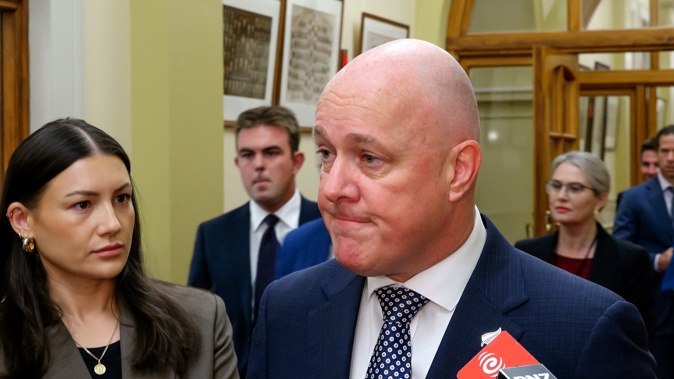
Prime Minister, Christopher Luxon has reaffirmed his party's refusal to support Act's Treaty Principles Bill and claimed his focus is on bigger issues, such as the "abysmal outcomes" involving Māori under the previous Government.
The bill was introduced by Act leader David Seymour, who said throughout his election campaign he wanted the principles of the Treaty defined. He managed to force a first reading of the bill in Parliament into his three-way coalition agreement with PM Christopher Luxon and New Zealand First leader Winston Peters.
On Wednesday last week, Luxon told the media he was adamant that the agreement with Seymour was only to get the bill into a first reading before a select committee, never any further.
This morning, Luxon was asked on The Mike Hosking Breakfast what was wrong with the idea of simply having a conversation about the Treaty's interpretation - given all that Seymour claimed he wanted to do was "to talk about it".
The Prime Minister reiterated his party's stance, that National did not support the referendum as it was "not helpful", but respected the fact Act wanted it as part of the coalition negotiations.
"Look, the bottom line is there is a way to talk about it - we've been talking about it for 180 years," he said.
Hosking said it had only been talked about to a point and asked why it would only go to the select committee stage and then no further.
"There will be a reiteration of the debate which will happen through the select committee process, that's the chance for all members of the public across New Zealand to have a contribution to that debate and discussion," said Luxon.
"Personally, from a National Party point of view, we don't think it's helpful going into referendum from there and that's why we said there's no commitment beyond first reading."
Asked if he would ever change his mind on the matter, Luxon said from his party's point of view it was a position they wouldn't support at all, they had been consistent on that message throughout their election campaign.
He said he appreciated Seymour and Act had a reverse position on the issue, but from his point of view, the treaty formed a partnership between the crown and iwi and was akin to partnership.
"What that [actually means], we've been working our way through that over 180 years and we'll continue to do so," he said.
Luxon then turned his attention to the "frankly...abysmal outcomes we've seen from Maori" under the previous Government in areas such as healthcare and education.
He pointed to two-thirds of Maori children not attending school regularly as being a big problem for the future.
"When we look at what's happening economically on housing, on health, as victims of crime, they're the issues I'm talking to every leader about...to get results because they went backwards under last Government."
Later in his interview, Luxon said he had been meeting with Maori leaders over the last year and a half and admitted there was "a whole lot of angst" around the Treaty Principles Bill and what it might mean for Maori.
"I get that, there's lots of conversation in the media about that. But actually, the bigger conversations that are actually happening are on how to work with Government, and they're quite excited to work together on this stuff," he said.
He used an example of wanting to improve the immunisation rates amongst Maori two-year-olds, he said currently 71% are immunised but that the Government wants to get rates up to around 90%.
The conversations he'd had with leaders and experts were productive, he said.
"We've partnered with Maori organisations - 'right, here are the targets, let's go for it, spend $50m but we're expecting results', and they're effective at doing that," said the Prime Minister.
"That's where our conversations are going because that's what matters."
When asked by ZB Plus about Luxon's comments, David Seymour said the last few decades had seen courts, academics and bureaucracy used a "partnership" interpretation to argue there were two different types of people in New Zealand - tangata whenua, or land people and tangata tiriti, treaty people.
He said the belief is both these people have different political and legal rights.
"This has driven a proliferation of co-governance arrangements and even racial quotas within public institutions," Seymour told ZB Plus.
He said the issues outlined by Luxon are extremely important and have many causes that defy easy explanations.
"Act believes the solutions lie in more robust, evidence-based targeting, greater devolution of public services, and maintaining New Zealand’s liberal democratic system," said Seymour.
"Our society is simply too diverse and intertwined to be separated into a binary system of two peoples."
Take your Radio, Podcasts and Music with you









